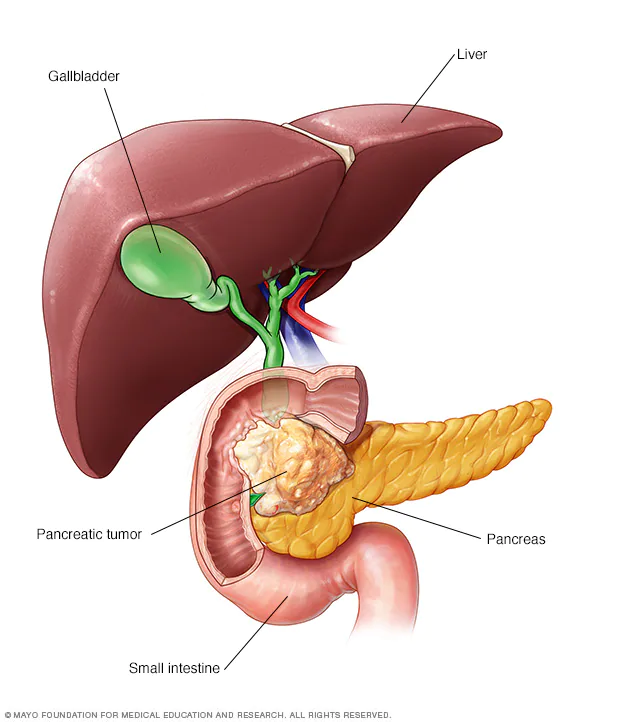Pancreatic Cancer
Pancreatic cancer is a type of cancer that begins in the pancreas, an organ located behind the stomach. The pancreas plays a crucial role in digestion and blood sugar regulation. Pancreatic cancer is often diagnosed at an advanced stage, and it tends to be aggressive with a relatively poor prognosis. Here are some key points about pancreatic cancer:

- Risk Factors:
- Age: The risk of pancreatic cancer increases with age, and it is most commonly diagnosed in people over 65.
- Smoking: Cigarette smoking is a significant risk factor, and smokers are about twice as likely to develop pancreatic cancer as non-smokers.
- Family history: Having a close relative with pancreatic cancer may increase the risk.
- Inherited gene mutations: Mutations in certain genes, such as BRCA2, Lynch syndrome, and familial atypical multiple mole melanoma (FAMMM) syndrome, can be associated with an increased risk.
- Chronic pancreatitis: Long-term inflammation of the pancreas may increase the risk.
- Diabetes: Chronic diabetes may be both a risk factor and an early symptom of pancreatic cancer.
- Obesity: Being overweight or obese may slightly increase the risk.
- Signs and Symptoms:
- Pancreatic cancer may not cause noticeable symptoms in its early stages.
- As the cancer progresses, symptoms may include jaundice (yellowing of the skin and eyes), abdominal pain or discomfort, unexplained weight loss, loss of appetite, and digestive problems.
- Diagnosis:
- Diagnosis often involves imaging tests such as CT scans, MRIs, and endoscopic ultrasound (EUS).
- Biopsy: A tissue sample is taken and examined under a microscope to confirm the presence of cancer.
- Types of Pancreatic Cancer:
- Exocrine tumors: The majority of pancreatic cancers are exocrine tumors, which arise from the cells that produce enzymes for digestion. The most common type is pancreatic adenocarcinoma.
- Endocrine tumors: These tumors, also known as pancreatic neuroendocrine tumors (PNETs), arise from the hormone-producing cells of the pancreas.
- Staging:
- Staging helps determine the extent of the cancer and guides treatment decisions.
- Treatment Options:
- Surgery: In some cases, surgery may be performed to remove the tumor or, in more advanced cases, a portion of the pancreas.
- Chemotherapy: Using drugs to kill cancer cells or stop their growth.
- Radiation therapy: Using high-energy rays to target and kill cancer cells.
- Targeted therapy and immunotherapy: These treatments target specific molecules involved in cancer growth or stimulate the immune system to fight cancer.
- Survival Rates:
- The prognosis for pancreatic cancer is often poor, mainly due to the late stage at which it is typically diagnosed. Survival rates vary based on factors such as the stage of cancer, the type of pancreatic cancer, and overall health.
- Research and Advances:
- Ongoing research aims to better understand the molecular and genetic aspects of pancreatic cancer, leading to the development of targeted therapies and immunotherapies.
- Early detection methods are an active area of research to improve outcomes for individuals diagnosed with pancreatic cancer.





